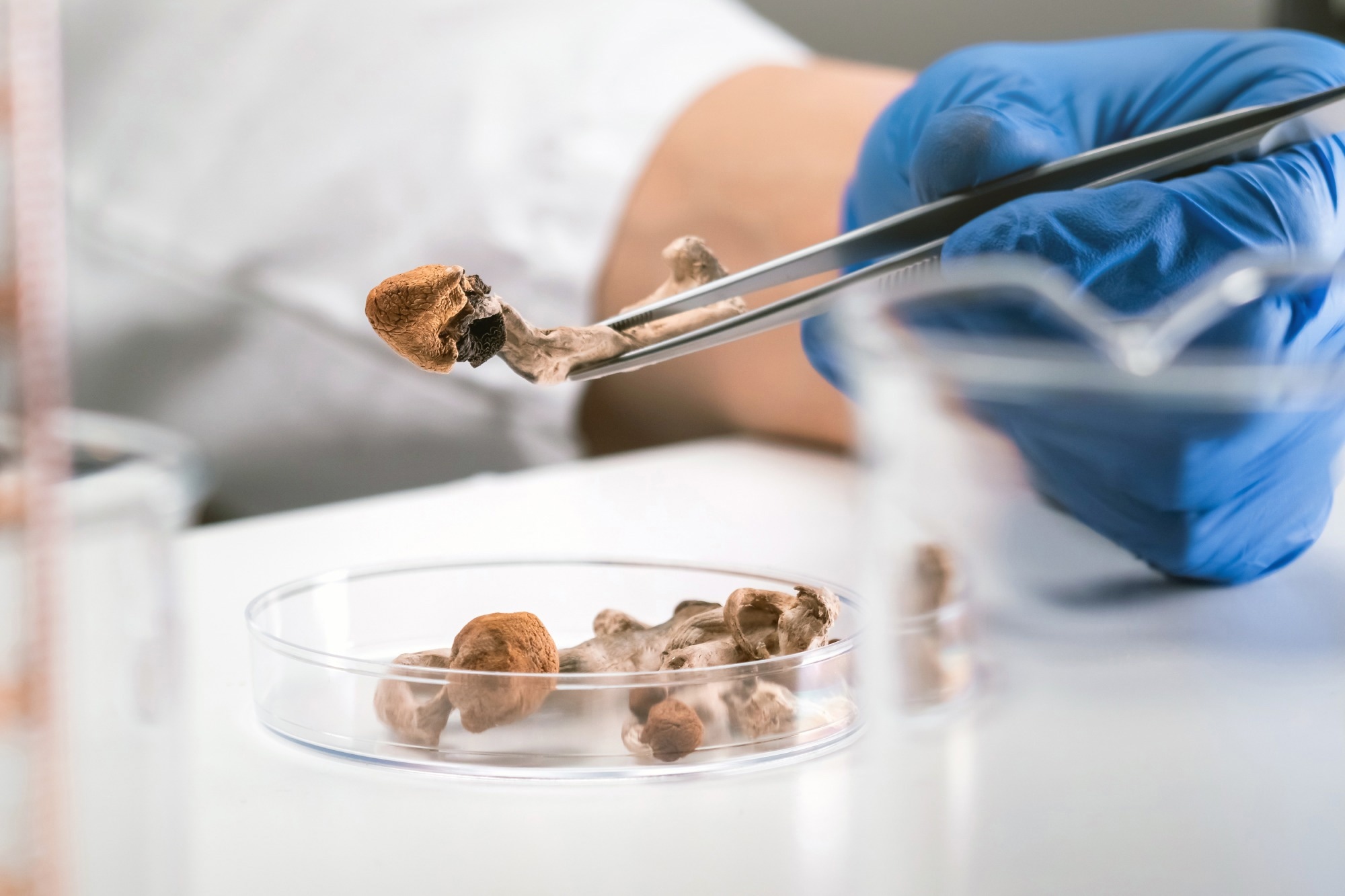In a recent study published in the JAMA Network Open, a group of researchers assessed the safety and acute adverse effects of therapeutic doses of psilocybin in treating depression and anxiety.
 Acute Adverse Effects of Therapeutic Doses of Psilocybin - A Systematic Review and Meta-Analysis. Image Credit: 24K-Production / Shutterstock
Acute Adverse Effects of Therapeutic Doses of Psilocybin - A Systematic Review and Meta-Analysis. Image Credit: 24K-Production / Shutterstock
Background
Psilocybin, a serotonergic psychedelic and prodrug of psilocin, transforms into its active form after ingestion, primarily affecting serotonin receptors in the brain's amygdala, thalamus, and prefrontal cortex. Initially explored in the 1960s, it requires about 10 mg orally to induce psychological changes, with effects intensifying at higher doses. Its psychological impact is similar yet distinct from lysergic acid diethylamide (LSD), featuring more intense visual experiences, less emotional depth, greater euphoria, and a reduced risk of panic or paranoia. Recent studies highlight its potential in treating resistant depression due to its interaction with serotonin pathways, which are crucial for mood regulation. With a resurgence in interest for its therapeutic applications in mental health, such as depression and anxiety, psilocybin-assisted therapy involves guided sessions to navigate thoughts and feelings. Further research is essential to fully understand the long-term safety, efficacy, and psychological impact of therapeutic psilocybin use in mental health treatment.
About the study
In the present systematic review, conducted in alignment with the Preferred Reporting Items for Systematic Reviews and Meta-Analyses (PRISMA) guidelines, the researchers sought to gather data on the use of psilocybin for treating major depressive disorder and depression in conjunction with other disorders, such as cancer-related anxiety and depression. They focused on randomized clinical trials that compared psilocybin against placebos or other comparators, like niacin or escitalopram, categorizing doses into low, moderate, and high ranges based on prior clinical evidence. The primary goal was to assess the adverse effects of psilocybin in these treatments, with a particular interest in the earliest reports of adverse events, given the short half-life of psilocin, the active metabolite of psilocybin.
To identify relevant studies, they conducted a thorough search through MEDLINE via PubMed, Web of Science, and ClinicalTrials.gov, spanning publications from 1966 to November 30, 2023, using specific search terms to filter for psilocybin-related side effects in depression and anxiety treatment contexts. This process ensured that only randomized, double-blind clinical trials conducted in English and reporting on the adverse effects of psilocybin were included. The analysis aimed to strengthen findings on the adverse effects associated with high and moderate doses of psilocybin compared to control conditions in treating depression and related anxiety disorders.
Statistical analyses were carefully carried out using R statistical software, incorporating methods to account for the variability across studies and ensure the robustness of their findings. The team employed the inverse variance method with adjustments for random effects and conducted sensitivity analyses to validate the results. Additionally, they assessed study quality and potential bias, ensuring a comprehensive evaluation of the available data.
Study results
In the present analysis, a total of 70 studies were initially identified. After a thorough screening process, 64 studies were excluded for various reasons, leaving 6 studies that met the inclusion criteria for detailed examination. These studies encompassed a combined sample of 528 participants, with a balanced gender distribution (approximately 51% female and 49% male) and a median age of 39.8 years. Notably, the majority of these participants were White, reflecting a lack of diversity within the study samples. The assessment of these studies using the Risk of Bias 2 (RoB2) tool indicated a low risk of bias, suggesting the reliability of the findings.
The adverse effects documented in these studies were closely scrutinized, revealing that participants commonly experienced these effects immediately or within 24 hours following psilocybin administration. The adverse effects analyzed included headache, nausea, anxiety, dizziness, paranoia, transient thought disorder, and elevated blood pressure. Notably, psilocybin administration was significantly associated with increased risks of headache, nausea, anxiety, dizziness, and elevated blood pressure when compared to controls. However, no significant associations were found with paranoia and transient thought disorder. The incidence of these effects varied, with headaches and nausea being the most common across the studies.
The meta-analysis of the safety data highlighted the consistent occurrence of specific adverse effects across the studies, with some, like elevated blood pressure, showing a high degree of variability (indicated by I2 value of 78%). Despite this, the overall findings remained robust across sensitivity analyses, which adjusted risk ratios slightly for some conditions but confirmed the consistency of the results for others.
Beyond the primary adverse effects analyzed, the studies also reported additional acute effects such as elevated heart rate, visual perceptual changes, physical discomfort, fatigue, euphoric mood, and mood alterations, affecting more than 5% of the participants in certain instances. However, these were reported in only one study each and thus were not included in the meta-analysis. Importantly, none of the adverse events identified in the analyzed studies were deemed serious, offering a detailed perspective on the safety profile of psilocybin when used in therapeutic contexts.